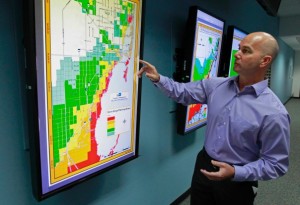 Within one of the most unique government services fields, the emergency management director is responsible for supervising the services offered before, during, and after a disaster strikes, whether natural or man-made. In addition to the increased risk for weather-related disasters due to changing climate patterns and population shifts towards coastal regions, the threat for terrorist attacks on the United States continues to climb in unsettling global times. As a result, employment for emergency management directors is expected to grow by 18% in the healthcare industry as more directors will be in demand for developing response plans to protecting citizens and property from disasters, according to the Bureau of Labor Statistics. If you are interested in entering a rewarding in-demand career, the following is a full job description of what emergency management directors do.
Within one of the most unique government services fields, the emergency management director is responsible for supervising the services offered before, during, and after a disaster strikes, whether natural or man-made. In addition to the increased risk for weather-related disasters due to changing climate patterns and population shifts towards coastal regions, the threat for terrorist attacks on the United States continues to climb in unsettling global times. As a result, employment for emergency management directors is expected to grow by 18% in the healthcare industry as more directors will be in demand for developing response plans to protecting citizens and property from disasters, according to the Bureau of Labor Statistics. If you are interested in entering a rewarding in-demand career, the following is a full job description of what emergency management directors do.
Responsibilities for Emergency Management Directors
In collaboration with law enforcement officers, elected officials, and government agencies, emergency management directors are given the hefty task of leading emergency responses during and after disasters have occurred. In planning responses to emergencies to minimize the risk to citizens, directors will analyze all resources, equipment, and staff that are available to respond to emergency situations. After plans are developed, directors will organize emergency response training programs, make visits to update community members on emergency plans, and review emergency plans of individual organizations. During a disaster, emergency management directors will need to lead the response, prioritize actions, conduct rescue missions, establish shelters, and order evacuations. Afterwards, directors will assess all damages, apply for state or federal funding for repairs, and revise plans for future disasters.
Emergency Management Director Work Environment
According to the U.S. Bureau of Labor Statistics, there are around 9,900 emergency management directors employed in a variety of work settings across the nation. While the majority of directors work for state or local government agencies, others will find employment for private corporations, universities, hospitals, non-profit institutions, and the federal government. Although emergency management directors spend more of their time working in an office to create effective response plans, they typically need to travel for meeting with agency personnel, organizations, or community groups. Most directors will work a full-time schedule, but most are on call 24/7 and will need to work long overtime hours in response to emergency situations.
How to Become an Emergency Management Director
In order to have the communication, critical thinking, decision making, interpersonal, problem-solving, and leadership skills needed to respond effectively in the face of danger, emergency management directors will need to have extensive experience in the field. Directors often have years of work experience in law enforcement, fire safety, emergency medicine, or other fields before receiving the promotion. Although multiple years of previous work experience trumps education, the majority of emergency management directors need a bachelor’s degree in public administration, emergency management, fire science, or disaster planning. In addition, it is typically recommended that directors further their skills and credentials by becoming a Certified Emergency Management through the International Association of Emergency Managers.
Related Resource: Emergency Medical Technician
Through a mix of education and valuable hands-on work experience, emergency management directors are vital members of the field who develop the best policies, plans, and procedures for handling dangerous crisis situations. If you have the ability to stay calm when danger strikes, are a natural born leader, and have a calling to protect people’s lives, then you should consider starting a rewarding career as an emergency management director.